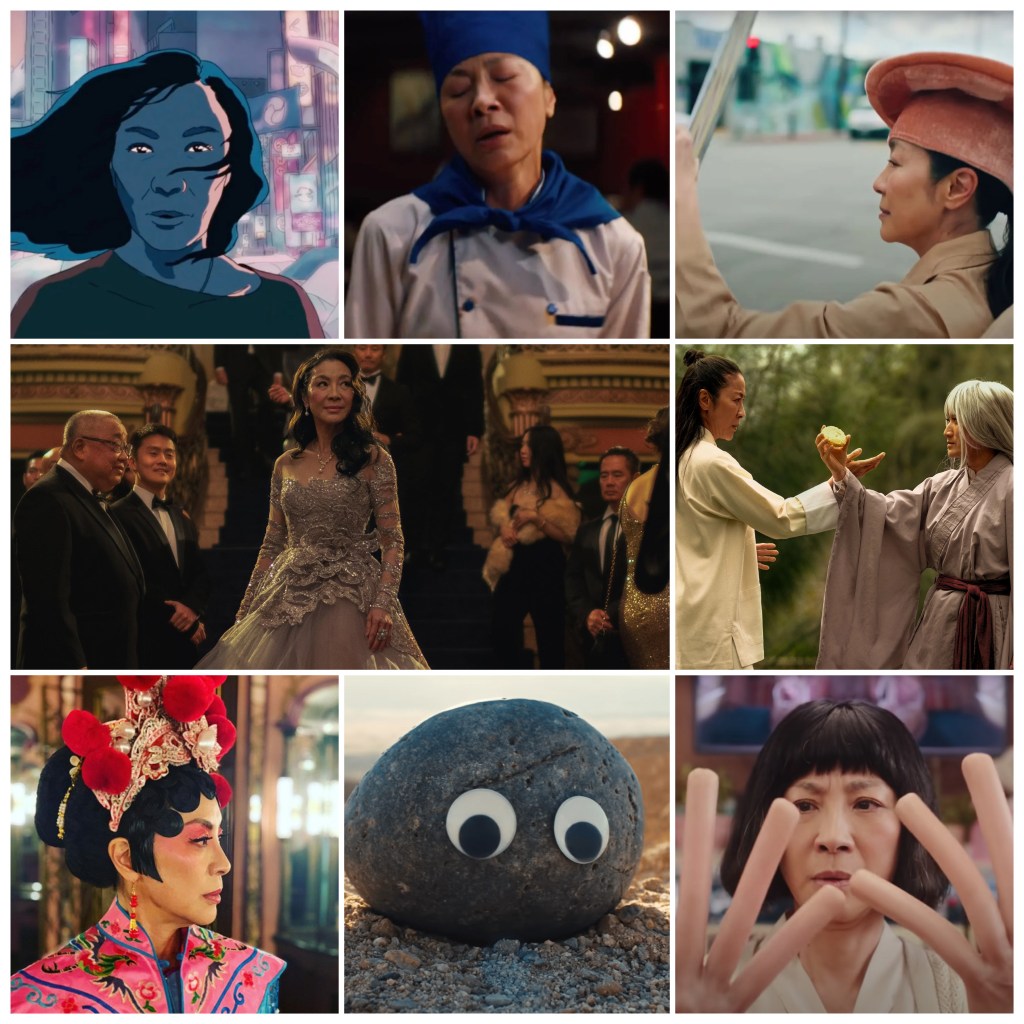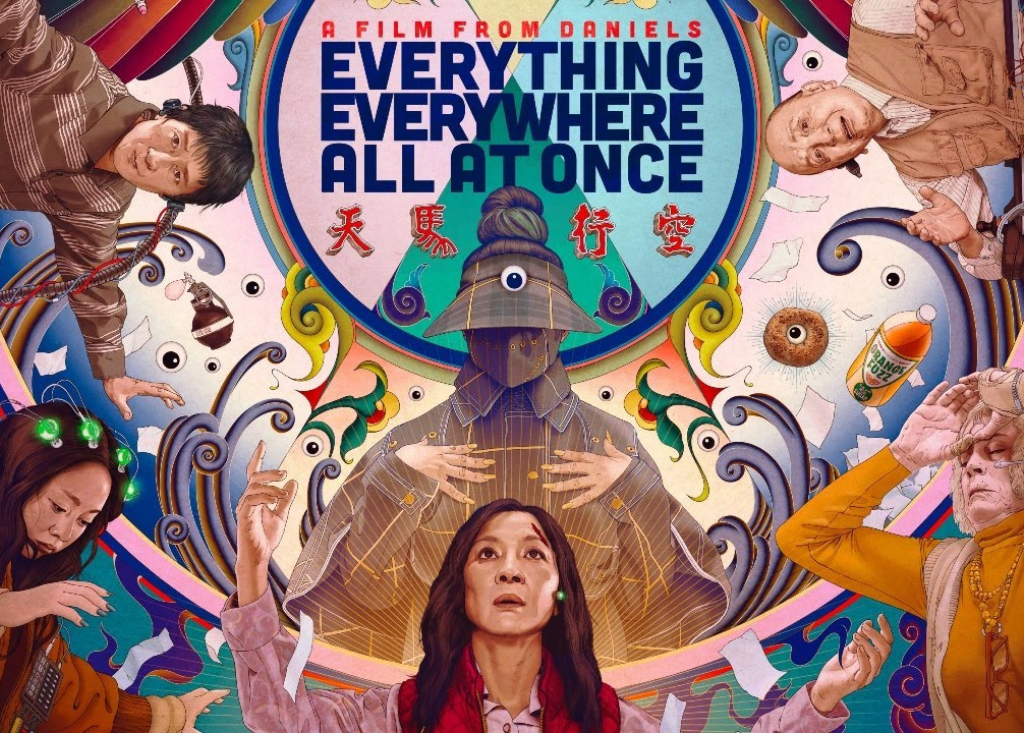It’s not just Marvel who are currently exploring multiverses and they certainly aren’t the first to tap into them. But while for some it may be hard to separate the idea of them now that Loki, Spider-Man: No Way Home and Doctor Strange in the Multiverse of Madness have all made multiverses the centre of the Marvel Cinematic Universe, films like Everything Everywhere All at Once are here to show us more confusing and deeper possibilities of multiple and parallel universes and what that could bring or mean – at least in a fictional world… Or not?
Everything Everywhere All at Once focuses on Evelyn Wang (the world’s first and biggest female Asian superstar, Michelle Yeoh), who runs a laundrette with her husband Waymond (played by “Mr Short Round” Ke Huy Quan) somewhere in America. Together they have a daughter, Joy (Stephanie Hsu, who had a supporting role as Soo in Shang Chi and the Legend of the Ten Rings) and are visited by Evelyn’s stern father “Gong Gong” from China (veteran actor James Hong whose career has spanned more than seven decades). But all is not well and all is not what it seems for Evelyn and her family. They are being audited by the IRS and there appears to be some troubling discrepancies in their taxes, and while at the IRS, Evelyn comes face to face with an alternate version of Waymond, who tells her she is just one of many Evelyns out there and that he believes (as do those from his universe, known as “The Alpha-verse”) that she is the only one who can defeat Jobu Tupaki, an “evil” entity in the multiverse and a threat to both Evelyn and said multiverse.
Of course the unassuming Evelyn (clever name to tie in with the title), who has been feeling very overwhelmed by a lot recently, doesn’t understand anything at all, repeatedly claiming “it doesn’t make any sense”. And to be honest, to most of the audience, it doesn’t – at least at first. Much of the information about what exactly is going on is fed through to Evelyn and us bit by bit as her consciousness constantly flickers back and forth between other parallel Evelyns and as “Alpha Waymond” also comes and goes. Things get more complicated for the couple and in general plot-wise when Joy and Gong Gong are implicated and play a bigger part than you’d have originally expected. And an alternate version of unimpressed auditor Deidre – Jamie Lee Curtis looking starkly different from how she normally does – also appear to play a part in the elusive but powerful Jobu Tupaki’s hunt for Evelyn.

The film is a mish-mash of genres from black comedy to thriller, from martial arts to drama, and from fantasy to sci-fi – deftly merging all of them together without losing elements of each of them. It is, however, an extremely strange, often silly and over-exaggerated, and quite baffling film to say the least. The multiple universes include ones where Evelyn is: a famous martial artist and film actress, a Chinese opera singer, a chef where her colleague is being controlled by a raccoon (in a crazy spoof of Pixar’s Ratatouille), a piñata, a rock, a drawing in the style of a small child, and in a relationship with Deirdre in a world where people have hot dogs for fingers.
It is understandably a little hard to follow with all the chaos going on, flip-flopping between universes and persona switching of its characters, but beyond that at its core are themes of love, family, personal aspirations and personal struggles that each of the Wang family battle with individually and together. And beyond that are the deeper concepts of existentialism and nihilism. For example, Evelyn is torn between the exasperating life she believes she lives in her own world and the many different lives she could have had had she followed a different dream or not married Waymond against her father’s wishes. She begins questioning herself, her existence and what went wrong in her life. While Joy/Jobu Tupaki is desperate to find out what the true meaning and her reason for living in any of the universes is. And she’s fed up, wanting it all to end. At least, that is sort of what I gathered when not distracted by her bizarre outfits and the black hole “bagel” she created.
However, all that aside, what Everything Everywhere All at Once does the most is bring and keep the faces and voices of Asian identities (specifically those of the Chinese diaspora) to the forefront of Hollywood cinema. There’s been Crazy Rich Asians, Mulan, Shang Chi and the Legend of the Ten Rings, Eternals and Turning Red, all big films that have boosted the profile of East Asian talent. The problem with Western White media is that they see films such as these as catering to only specific people based on the appearance of their cast and the identities of the characters. This happened with Turning Red and one critic said Everything Everywhere All at Once lacked any stars. Since when were Michelle Yeoh and Jamie Lee Curtis not stars? Is it because one is not White and the other is not seen as conventionally beautifully and under 30?

Interestingly, as well as a nearly all-Asian main cast in principle roles, it is directed, co-written and co-produced by “The Daniels”, Daniel Kwan and Daniel Scheinart, the former being of Chinese origin. This gives the film an Asian voice, from what can be assumed was at least partially drawn from his own lived experience. What is also interesting is that the Russo brothers – who are well-known for their work on Marvel films – co-produced it under their company AGBO. Everything Everywhere All at Once is a far cry from their big blockbuster Marvel movies in terms of budget and production size but in line with the majority of their fast-paced action thrillers and dramas.
The film nicely represents Asian-American life as a non-native couple who struggle to keep their business running smoothly and afloat while dealing with the trials and tribulations of an American-born Chinese daughter, who is rebellious and – gasp – a lesbian. Deirdre also exhibits a racial micro-aggression when she speaks louder and slower for Evelyn at one point as if she can’t understand English, which for too many non-White people is an everyday occurrence. Evelyn may seem like a typical “Tiger mum”, pushing her daughter to be the best she can be while living in a marriage that is hanging by a thread, but the many other Evelyns she becomes shows a different possibility of herself that she could have been – both for better or for worse, depending on of course what that means. In the universe she is an A-star celebrity she has no husband or family and in the one where she has hot dogs for fingers she is at least in a loving relationship.

The family hold on to and believe in cultures and traditions they know, such as celebrating Chinese New Year all the way to deciding not to tell Gong Gong about Joy’s sexuality and her girlfriend Becky because he is from “that generation”. There is also the languages spoken. Evelyn converses with Waymond in Mandarin, but Cantonese with her father, and they mix English and Mandarin with Joy, who speaks extremely basic Mandarin but appears to understand it at least, and doesn’t know Cantonese – she attempts Mandarin with Gong Gong, who fails to understand her. Evelyn and Waymond constantly code-switch between Mandarin and English, which is quite an accurate representation of many overseas Chinese people, particularly those who are not from Mainland China. For me, this rang quite true as to what I experienced as a child in our family.
At the heart of the film, as I mentioned, love and family are two prominent themes. In terms of Asian representation and Chinese culture, this is multi-faceted and interlinked. Evelyn feels regret for upsetting her father leaving with Waymond when she was younger but bottles up her feelings knowing deep down things with him are no longer happy. She is both frustrated with how Joy has “turned out” yet is adamant she has done everything for her in her best interests, while Joy is feeling trapped under her mother’s overbearing presence and fraught with desire to be free of everything, to an extent where she – like some second and beyond generation children – feels very disconnected from her Asian identity and heritage. Its premise is a little like Turning Red, except non-animated, creepier, crazier and on steroids.
The concepts of “keeping face” and “keeping out of trouble” that are embedded in many Chinese people’s mindsets also recur throughout. This is particularly shown in scenes such as in the IRS building, in the family’s laundrette in front of customers, in the face of the police and even in private behind closed doors giving the characters more complexity that audiences can relate to. Of course – according to some people – Western audiences could feel alienated and won’t understand why they behave and act as they do in some situations, but these concepts are certainly not as hard to understand as the plot.
It also borrows elements from classic Chinese and Hong Kong kung fu and comedy films, with the completely random and over-the-top scenes that appear to make no sense but in the realm of the multiverse they could easily be possible. And of course the martial arts fights flip between traditional, authentic moves and either Matrix-style or even slapstick sequences (for example, Waymond has his bum bag) that if you’re not familiar with Chinese films you are likely to think you’ve entered another world – which is the whole point, I guess.

Everything Everywhere All at Once is a chaotic, intriguingly visual film that will make you leave the cinema either impressed, overloaded or confounded (or all three), where its deeper meanings certainly make you think – both on a relatable and realistic level as well as on a supernatural and otherworldly level. But on a more important note, it’s another win for East Asians on the big screen. Michelle Yeoh further continues to flex her acting chops beyond her martial arts skills (I would say karate chops just for the pun of it, but that would be grossly inaccurate…) that she has displayed in various films she’s done, especially more recently. It has allowed the likes of Ke Huy Quan to venture back into acting in a co-leading role, who was inspired to do so after the recent increase in films for Asian actors, and it further cements James Hong as one of the most prolific Asian names and faces in TV and film. Meanwhile, Stephanie Hsu gets more exposure as an actress, which is great when she is not particularly well-known already. Harry Shum Jr., who has had a number of roles over the years has a bit part in this as Evelyn’s raccoon-controlled chef colleague in another universe.
The testament that counters the one racist and ageist critic’s comment about the film having no stars is that its blockbuster revenue has tripled its original budget to become the highest-grossing film for production company A24 and it has received universal critical acclaim. This is in spite of the fact it’s viewed as a more indie film, is led by Asian actors and almost half the dialogue is not in English. In regards to the subtitles, I hope one day a film with some Chinese dialogue will not have to be subtitled so that it does not place emphasis on one language over another, which is an interesting and respectful decision made by Steven Spielberg for West Side Story. So here’s hoping there are more varied and diverse films for us which not only push the boundaries of filmmaking but representation of us and the perceptions of us.



Leave a comment